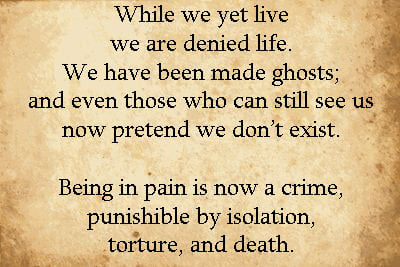1- I remember way back when advocacy for pain pts started merging with the addiction community's advocacy.
Pushed back on ADX community's mantra of opioid 'over prescribing' & stated that drugs don't cause ADX.
Maia Szalavitz chastised me, told me to basically stay in my lane.
Pushed back on ADX community's mantra of opioid 'over prescribing' & stated that drugs don't cause ADX.
Maia Szalavitz chastised me, told me to basically stay in my lane.

2- In fact, many in the 'upper echelon' of advocacy still embrace the #PainParole status quo & the 'over prescribing' narrative.
Usually if one pushes back, we're blocked or put on the blacklist of CPPs, and now there's even a blacklist for 'rogue' addiction advocates. 🤔🤫
Usually if one pushes back, we're blocked or put on the blacklist of CPPs, and now there's even a blacklist for 'rogue' addiction advocates. 🤔🤫

3-You see I was here advocating since the time when the first seeds were being planted on Twitter re: our E-advocacy. #ShareOurPain was a small ragtag group of CPPs who banned together for the cause. This was before there even was an 'upper echelon'.
4-I was even one of the few who suggested that allying with the addiction community might be to our advantage in achieving needed change. As the false narrative around addiction HAD to be confronted if we were to make any progress. Many CPPs hated on me for even suggesting it.
5-Didn't seem to matter to many that not only had I suffered with #Chronicpain for decades, I had a career in the medical field, & my daughter & loved ones struggled w/alcohol & drug addiction.
I came to the table w/a lot of knowledge, lived experience, perspective, & insight.
I came to the table w/a lot of knowledge, lived experience, perspective, & insight.
6-I remember introducing several people in the pain community on Twitter & promoting their respective work. Many in our little group were hesitant, I guess presciently, as those same people are now rubbing elbows with the upper echelon, looking down on the rest of us. 😔
7-Not sure of my role in advocacy anymore I've tried so hard to fight for EVERYONE. To put a stop to harmful policies, narratives, practices. To unite CPPs and even help the ADX community as it's the #DRUGWAR that's killing us both; despite different tx needs.
8-I feel lost, unsupported by those sitting at the 'adult table', admonished that truth is not allowed there.
Feeling broken beyond healing after the loss of my daughter, w/little hope remaining when it's obvious CDC/PROPs agenda is killing people yet few changes
are coming
Feeling broken beyond healing after the loss of my daughter, w/little hope remaining when it's obvious CDC/PROPs agenda is killing people yet few changes
are coming
• • •
Missing some Tweet in this thread? You can try to
force a refresh






